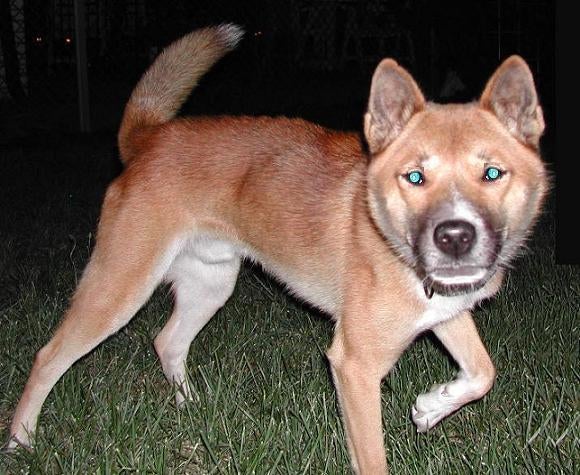Researchers believe New Guinea singing dogs are still thriving in the wild
Ancient breed was thought to be extinct in wild

The New Guinea singing dog was thought to be extinct in the wild, with only a few left continuing their unmistakable wails in captivity.
However, research from Proceedings of the National Academy of Sciences (PNAS) collected in 2020 claims that extremely rare wild singing dogs do still exist and roam around the Papua highlands.
The aptly named singing dog does just as it is named; they are known for letting out unusual yowls instead of barks. The dog vocalises what can only be described as a “wolf howl with overtones of whale song,” the report stated.
While they are not related to the huge sea creatures, they are believed to be cousins of the Australian dingo, who are also accustomed to letting out wailing sounds.
New Guinea is the world’s second-largest island and is made up of two halves - the east side, known as Papua New Guinea and the west half, part of Indonesia, known as Papua.
The dogs were first described after the breed was spotted at an altitude of about 2,100 metres in Papua New Guinea in 1897, the study said.
Scientists delved into their theory that the loud dogs were still thriving by comparing DNA evidence from singing dogs in captivity and Highland wild dogs they thought to be of the same breed.
Conservation biologist has believed for years that the New Guinea singing dog was either extinct or close to extinction due to their loss of habitat and contact with village dogs.
Between 200 and 300 of the dogs are thought to be alive in captivity and are mainly bred for conservation purposes.
Highland wild dogs were also known to exist but were rarely seen by other people, as they hid away in higher altitudes from villages lower down, so much so that before 2016, they were only photographed twice - once in 1989 and once in 2012.
Between 2016 and 2018, a group of scientific expeditions took to the New Guinea highlands to try and retrieve blood DNA samples from the highland dogs.
They found the dogs living around the Grasberg mine, one of the world’s largest gold and copper reserves.
After the successful retrieval in 2018, they compared the DNA to the captive singing dogs and found that their results matched each other more closely than any other dog breed.
While the sequences weren’t identical, they had a 72 per cent match; the research team put this down to the physical separation the two groups have had for decades, as well as the inbreeding of the singing dogs tampering with their minute gene pool.
“They look most related to a population of conservation biology New Guinea singing dogs that were descended from eight dogs brought to the United States many, many, many years ago,” said Elaine Ostrander, the lead author of the study and an investigator at the National Institutes of Health, according to CNN.
“The conservation dogs are super inbred; (it)started with eight dogs, and they’ve been bred to each other, bred to each other, and bred to each other for generations – so they’ve lost a lot of genetic diversity.”
While this research is significant for greater research of the once-lost wild breed, the findings also could create a further understanding of the domestication of dogs.
“They provide this missing piece that we didn’t really have before,” Dr Elaine Ostrander, a co-author of the report said, according to The New York Times.
She explained that the breed may have a common ancestor with Asian dogs that migrated with humans to Oceania around 3,500 years ago, who also later produced the Akita and Shiba Inu breeds.
Subscribe to Independent Premium to bookmark this article
Want to bookmark your favourite articles and stories to read or reference later? Start your Independent Premium subscription today.

Join our commenting forum
Join thought-provoking conversations, follow other Independent readers and see their replies